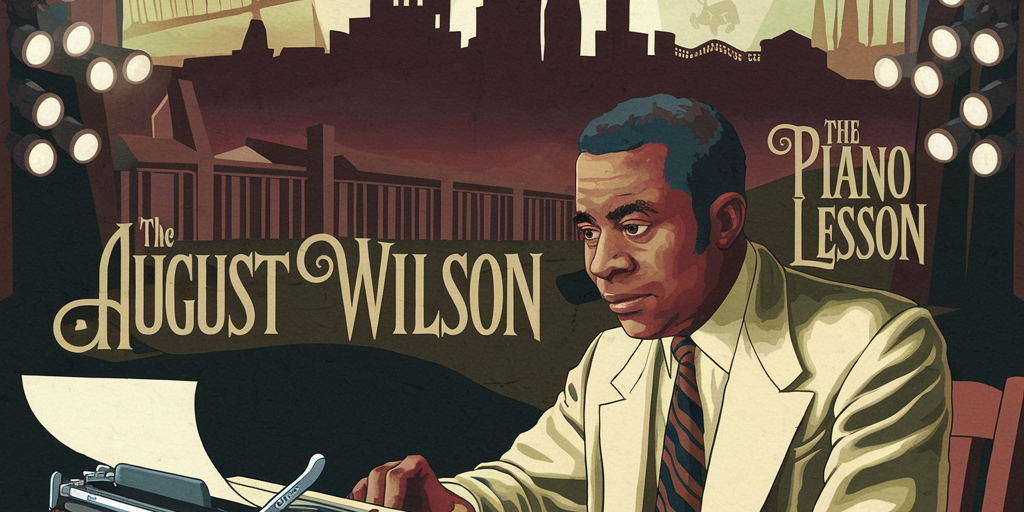Introduction: The Playwright Who Made the Hill District Legendary
Few artists have captured the soul of Pittsburgh — and the Black American experience — like August Wilson. Born and raised in Pittsburgh’s historic Hill District, Wilson became one of the most important playwrights in American history. Through his powerful “Pittsburgh Cycle” — ten plays chronicling Black life in the 20th century — Wilson transformed the stories of ordinary African Americans into timeless art.
His words gave voice to the dreams, struggles, and triumphs of Pittsburgh’s Black community, earning him two Pulitzer Prizes, a Tony Award, and a place among America’s greatest cultural figures.
Early Life: A Hill District Son
August Wilson was born Frederick August Kittel Jr. on April 27, 1945, in the Hill District, a vibrant but economically challenged Black neighborhood known as “Little Harlem of Pittsburgh.” His mother, Daisy Wilson, was Black, and his father, a white German immigrant, was largely absent.
Growing up in the racially charged 1950s, Wilson experienced firsthand the effects of segregation, poverty, and systemic racism. When his family moved to a mostly white suburb, young August faced harassment and bullying, eventually dropping out of high school at age 15. But he never stopped learning — devouring books at the Carnegie Library of Pittsburgh, where he would later be honored with his name on a branch.
Finding His Voice: From Poetry to Playwriting
Wilson started as a poet in the 1960s, inspired by the Black Power movement and figures like Malcolm X and Amiri Baraka. In the 1970s, he co-founded Black Horizons Theater in Pittsburgh, giving him his first platform for exploring Black life on stage.
It was there that Wilson began crafting what would become his life’s work — The Pittsburgh Cycle, also known as the Century Cycle.
The Pittsburgh Cycle: Chronicling Black America
Spanning ten plays, each set in a different decade of the 20th century, the Pittsburgh Cycle paints an intimate, multi-generational portrait of African American life. Nine of the ten plays are set in the Hill District, turning the neighborhood into a character itself.
Major Works Include:
- “Fences” (1985): Explores race, family, and failed dreams through Troy Maxson, a former Negro League baseball player turned bitter garbage man. Won the Pulitzer Prize and Tony Award.
- “The Piano Lesson” (1990): A family struggles over a treasured heirloom — a piano carved with the faces of their enslaved ancestors. Also won the Pulitzer Prize.
- “Ma Rainey’s Black Bottom” (1984): Set in a Chicago recording studio, this play tackles exploitation in the music industry.
- “Joe Turner’s Come and Gone” (1988): Centers on displaced former slaves seeking identity and belonging.
Wilson’s cycle addressed racism, economic hardship, dreams deferred, family legacies, and cultural pride — themes that resonated with Black audiences and beyond.
National Recognition and Broadway Success
Wilson’s work struck a chord nationwide. His plays premiered on Broadway, starring legends like James Earl Jones, Denzel Washington, Viola Davis, and Angela Bassett.
He won:
- Two Pulitzer Prizes (1987, 1990)
- Tony Awards
- Drama Desk Awards
Wilson’s voice was unique — unapologetically Black, deeply poetic, and universally human. He often said:
“I don’t write for white people. I write for myself and for black people.”
Yet his work transcended race, shining a light on shared human struggles.
Legacy in Pittsburgh and Beyond
August Wilson never forgot his roots. The Hill District remained his creative wellspring, even as he gained national fame. Today, Pittsburgh honors him in many ways:
- The August Wilson African American Cultural Center downtown.
- The August Wilson House, his childhood home on Bedford Avenue, preserved as a cultural landmark.
- The August Wilson Theater on Broadway, the first named after an African American.
Denzel Washington’s film adaptations — including “Fences” (2016) and “Ma Rainey’s Black Bottom” (2020) — introduced Wilson’s work to new generations, earning Oscar nominations and critical acclaim.
Death and Enduring Influence
Wilson passed away in 2005 at just 60 years old from liver cancer. But his impact only grew. Today, his plays are staples in American theater, studied in schools and performed worldwide.
His writing captured the complexity of Black life — filled with laughter, pain, music, and pride — ensuring that Pittsburgh’s Hill District would forever be known as a place of art, history, and resilience.
Conclusion: Pittsburgh’s Storyteller to the World
August Wilson turned the struggles of ordinary Black Pittsburghers into poetic, powerful theater. Through his words, the Hill District became a universal stage, and the voices of its people echoed far beyond city limits.
His work remains a towering achievement — a reminder that Pittsburgh’s Black story is America’s story.
“Confront the dark parts of yourself, and work to banish them with illumination and forgiveness.” — August Wilson









